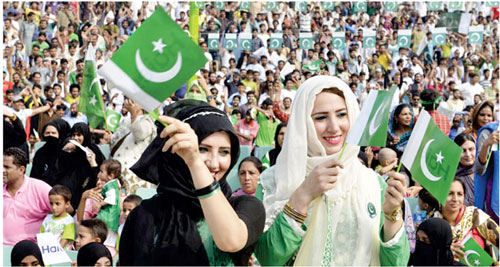Independence Day
As the Indian Independence Act had cited the setting up of two sovereign dominions on Aug 15, Mountbatten arrived at Karachi a day earlier, for the partition and announced transfer of power on 14 Aug to Muhammad Ali Jinnah, with effect from midnight, 14 and 15 Aug 1947.
Later, in June 1948, PM. Liaquat Ali Khan’s Cabinet proposed that we celebrate our Independence on 14 Aug, since it was announced on that day and as Pakistan standard time was 30 minutes behind India. It was also argued that in 1947, Aug 14 coincided with the auspicious occasion of the 27 Ramazan 1366 (H). The Quaid gladly approved these recommendations.
On 15 Aug, the Reserve Bank of India released Rs.20 crores to Pakistan in accordance with the agreement of division of assets and promised to pay the remaining Rs.75 crores soon after. However, it withheld the balance amount on many pretexts, until April 1948.
According to SBP records, India still owes Pakistan, over Rs.560 crores, equivalent to the present-day value of assets, when adjusted for inflation. Further, out of 500,000 pre-partition Indian troops, approximately 100,000 were earmarked for Pakistan’s, however these mostly comprised lower ranking soldiers and non-combatants, scattered all over India.
Their assembly and movement was to be carried out by rail, but 53 such trains were vandalized en-route; forcing adoption of much longer, time-consuming sea route from Bombay to Karachi. Out of 33 percent share of Pakistan’s military wherewithal, only two percent was delivered.
Vital items like tanks, guns and military transport were never received and what was, comprised perishable, unwanted, obsolete or wrecked items; while India retained all the 17 ordnance factories and depots. Thus, it seemed that Mountbatten and Indian leaders were determined to make Pakistan a weak and feeble state, at the mercy of India.
This environment enabled India to occupy Junagarh and Kashmir in Oct 1947 where the elected assemblies had earlier committed to acceding to Pakistan, and emboldened Afghanistan to vote against Pakistan’s admission to UN and to claim erstwhile FATA and parts of NWFP.
It would always be a matter of tremendous pride and glory for us, how creditably we rose to carry such heavy burdens on our young shoulders, how we built Pakistan, literally from scratch and how we survived, after partition, despite the most challenging and trying circumstances.
This year, we are celebrating the 75th birthday of our independence amid real and perceived apprehensions about our politico-economic stability. But we have proved our resilience and like the past, we shall undoubtedly steer out of our present predicaments, unscathed.
For this, we must shun all despondence, (induced mainly by fake social media), and recall what Iqbal had advised: “Don’t fear the intensity of opposing-winds, O’ Eagle; they blow to help you fly even higher’.
Concomitantly, we should seek guidance from the conduct of the Quaid and his counsel, during our arduous freedom struggle: On democracy he professed ‘…. the affairs of the state shall be guided by discussions and consultations, as taught by the Almighty’.
He constantly demonstrated that the interests of Pakistan were above everything else and preached’ that honesty in public life is more important than private affairs.
He preferred ‘defeat to winning elections by dishonest and corrupt practices’; and advised; ‘do not criticize others unless you yourself have learned to respect the law’.
He explained that ‘Freedom does not mean to behave as you please, irrespective of the rights of others’. On higher decision making, he directed: ‘Think 100 times before you take a decision, but once it is taken, stand by it as one man’.
On criminal law, he pronounced: ‘… every attempt …that undermines the authority of the government or disturbs law and order deserves the strongest condemnation and the highest punishment’.
On formulation of national policies, he believed: ‘… the government must be stable, with policies, grounded on facts…with a view … to safeguarding the life and independence of the nation, neither sentiment nor illusion must influence our policy. ‘Our foreign policy is one of friendliness and goodwill towards all the nations…’.
When asked how he hoped to build Pakistan’s economy when there is no industry, he replied: ‘I have every faith that our people will develop this’.
On national security he stated, ‘The best way… is by removing the temptation from the path of those who think we are weak’, and reassured that ‘…Pakistan has come to stay and no power on earth can undo it’.
On education spending, he desired: ‘ I say find the money, if necessary, tax the people, but I shall be told that the people are already taxed….that we shall be facing great unpopularity… it is the duty of … government to educate their masses. And if you face unpopularity… face it…in the name of duty’.
On political leadership he desired: ‘I do not accept the proposal to be elected as President of the Muslim League for life and insist on fresh elections as per rules’; ‘If politicians do not act honestly, don’t make them your leaders.
You can do that for me as well’. Soon after independence, he confided with an aide‘–I never expected to see Pakistan in my life time.
We have to be very grateful to the Allah Almighty for our achievement’. Finally he gave us a motto: ‘With faith, unity, discipline and devotion to duty, there is nothing worthwhile that you cannot achieve’.
On this Independence Day, let’s pray that the Almighty reward the millions who sacrificed their lives, properties and dear ones during the partition; let’s pay homage to our founders, for their four decades of freedom struggle and resolve to emulate them in conducting our national affairs and achieving the ideals of our sovereignty, prosperity and fraternity.
Finally, let’s cherish our liberty, but remember a divine proclamation for its preservation:‘….there is not for man except that, for which he strives (53:39).
—The writer is the former President of NDU







